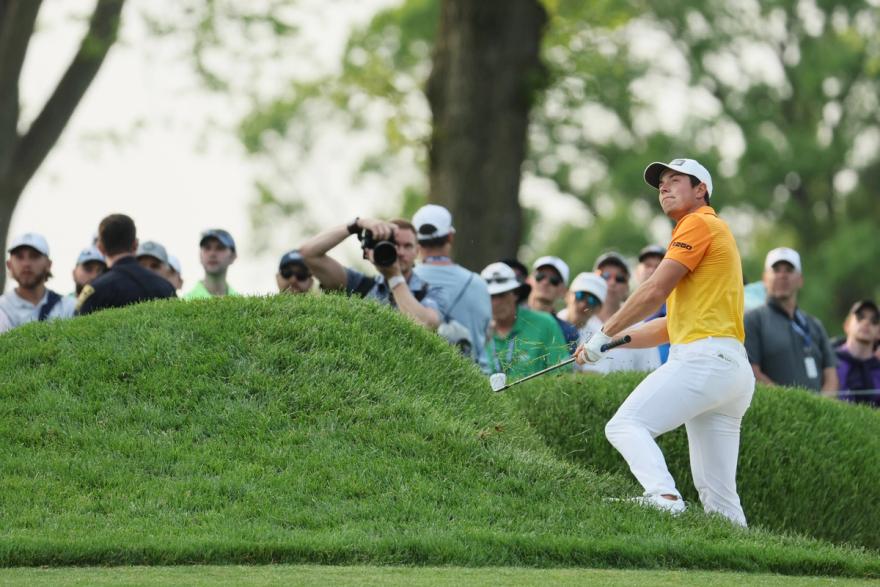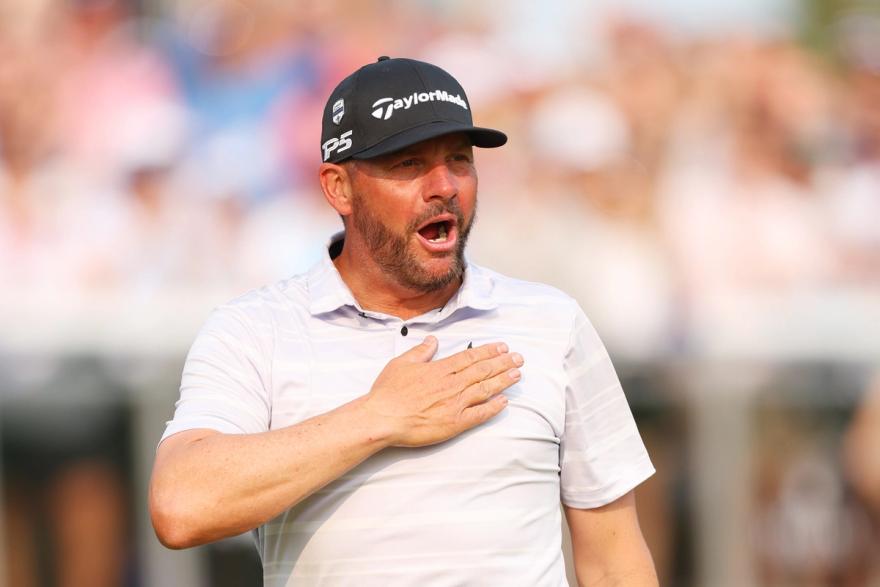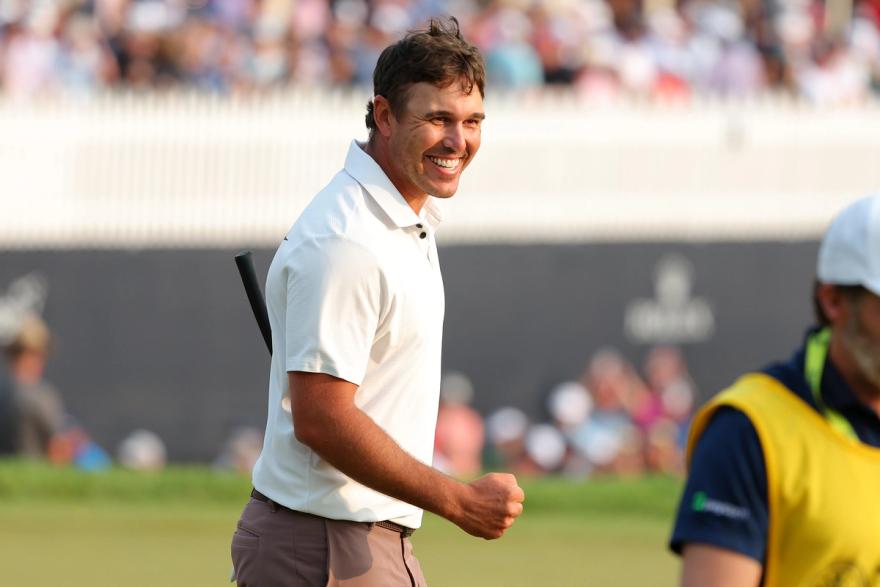ROCHESTER — Viktor Hovland was wiggling his feet in the sand. He was trying to stay poised, to stay in the moment, but the task in front of him was enormous. He was standing in a fairway bunker on the right side of the 16th hole at Oak Hill, trailing Brooks Koepka by a shot. All day, Hovland had hung so tough. He’d refused to flinch, even when Koepka briefly stretched his lead to four. But now he had to hit the shot of his 25-year-old life, a 9-iron with the ball below his feet. He needed to stay level, maintain his spine angle, but also get the ball up quickly, over a mound that was roughly the size of a small whale.
He took a deep breath, gripped then re-gripped his club, and swung.
The PGA Championship essentially hung in the balance.
The ball never got six inches off the ground.

Hovland blasted it directly into the face of the mound, and you could hear, in succession, a muffled thump as it disappeared into the grass and dirt, then a groan from the gallery. Hovland said nothing, but looked toward the sky in agony, then put his gloved left fist to his mouth and lightly bit down on his knuckles.
He knew. Everyone knew. He had flinched.
Five minutes later — after Hovland’s lengthy discussion with a rules official, a drop for an embedded ball and a despondent chip out — Koepka addressed his ball up ahead in the rough. It took him roughly 10 seconds to pull the club back. But when he did, he delivered one of the most ruthless shots I’ve seen on a golf course. His wedge slashed through the thick rough like he was using a filet knife. The ball climbed into the blue-gray sky, but only a little. It seemed to float under the wind, and for a few seconds, everything was deathly quiet. It landed on the front of the green, skidded a bit and released. It came to rest four feet from the hole.
Koepka knew.
Hovland, marching morosely toward his ball, also knew.
Everyone watching, in fact, knew. The tournament was essentially over.
That is what I’ll remember most about the return of Brooks Koepka, and the day he became just the 20th man in history to win a fifth major – that he saw a moment of weakness in his closest pursuer and he pounced. He snatched the soul right out of Hovland’s body. He hit 67 shots Sunday on his way to a 2-stroke victory over Hovland and Scottie Scheffler. But that one hovers above all of them.
“Brooks is a player that, when he gets in contention, he’s like a shark in the water,” said Masters winner Jon Rahm.
There have been plenty of times, in recent years, when Koepka had a chance to deliver a dagger on a Sunday at a major. Plenty of times, he let those moments slip away. He even referred to them, early in the week of the PGA Championship, as choking. (His words.) It seemed partly done in jest, to get the phrase out there before anyone else could bring it up. But it was also a reflection of his own high standards. Winning majors is hard, and plenty of golfers let opportunities slip away. Koepka once prided himself on not being one of them, and he hated that injuries and mental mistakes eroded that aura of invincibility. But he learned from those miserable moments, and perhaps Hovland will too, one day.
“I've always learned more from the four times I finished second than, I guess, the five times I've won now,” Koepka said, standing next to the Wanamaker Trophy for the third time. “I think failure is how you learn. You get better from it. You realize what mistakes you've made. Each time I've kind of made an adjustment. It's more mentality than it is anything. It's not really golf swing or anything like that. I think the big key is just being open and honest with yourself, and if you can do that, you'll be miles ahead of everybody else.”
Losing to Rahm at the Masters in April, as devastating as it was, taught him something about himself. He won’t say what it was, only that he plans to draw on it frequently from now on.
“I learned from it,” Koepka said. “I'm very pleased with what I took from it, and I'm pleased with the honesty I was able to dive into. My best friend, actually, my brother's caddie, my best friend, I think we stayed up probably most of the night just chatting about it, and he kind of ripped into me pretty good about it. He was texting me all last night about it and making sure that I wouldn't fall into the same trap.”
No matter how you feel about LIV Golf and the PGA Tour and the ongoing battle between the two leagues, Koepka’s reemergence is worth celebrating. He is now, unquestionably, the most successful golfer in major championships who is younger than Tiger Woods and Phil Mickelson. You can view this win as a boon to LIV, as a symbolic middle finger to everyone who said LIV golfers were washed and couldn’t compete against the best in the game. You can also view it as something bigger than golf’s civil war, as a reminder that the game was more interesting when Koepka was healthy and hoovering up major championships at an alarming rate. Koepka was happy to plant a foot in each camp on Sunday.
“I definitely think it helps LIV, but I'm more interested in my own self right now, to be honest with you,” Koepka said. “Yeah, it's a huge thing for LIV, but at the same time I'm out here competing as an individual at the PGA Championship.”
The fairest assessment would probably be to say that LIV Golf and Koepka have been mutually beneficial to each other. Guaranteed money and fewer tournaments — that also featured fewer rounds — certainly helped Koepka focus on getting healthy again. And now between Koepka and Cam Smith, LIV Golfers have won two of the last three major championships held.
“It just validates everything we’ve said from the beginning,” said Bryson DeChambeau. “The truth always comes out eventually.”
It’s also fair to say that the emergence of LIV Golf has only heightened the importance of the majors, because it is now the only time when all the best players in the world are facing each other. Regardless of what happens with the Official World Golf Rankings discussion, whether LIV ever gets ranking points for its tournaments, Koepka just earned exemptions into all the majors for the next five years.
“The problem with LIV is it’s not a competitive tour, it’s another tour,” said Pete Cowen, one of Koepka’s swing coaches. “But it’s been good for him because at the time we thought his injuries were not going to be corrected. So 14 tournaments a year plus four majors would be fine. And now he’s got another five years of exemptions.”
Koepka has been a little coy over the extent of his injuries, but he’s also made a conscious effort to be more open and more human over the last year, and that includes participating in the first season of Netflix’s “Full Swing” where he expressed doubt that he’d ever play great golf again.
“It was a lot worse than I let on to you guys,” Koepka said. “It's been a long road. But look, that's who I am. I'm open and honest. I know I seem like this big, bad, tough guy on the golf course that doesn't smile, doesn't do anything, but if you catch me off the golf course, I'll let you know what's going on. Like, I'm happy they got that side; right? That's truly me, and some people might hate it, some people might dog it, but at the end of the day, it's just me.”
As he walked off the 18th green and toward the scoring tent, you could see the emotion washing over him. The stoicism he’d displayed all tournament was melting away.
What was going through his mind at that moment?
"Pardon my language but it was all the fucking shit I had to go through,” he said. “No one knows. No one knows, I think, all the pain. There were a lot of times when I couldn’t even bend my knee. So yeah, it felt good."
Koepka’s return to the summit of golf will be the biggest historical takeaway from the 105th PGA Championship, but it won’t be the only storyline that lives on. Michael Block, a teaching professional from California, finished tied for 15th in the tournament and was the belle of the ball for much of the week — high-fiving fans, getting choked up in interviews, bouncing back from shanks, throwing darts at pins. The story crested emotionally on Sunday when he made a hole-in-one on the 15th hole. The ensuing roar was as loud as anything you will ever hear on a golf course, and it earned him a hug from playing partner Rory McIlroy.
“He had to tell me five times that I made it,” Block said. “So it was a pretty cool experience to have Rory be telling me that I made a hole-in-one in front of God knows how many people that were supporting me.”

Block, who had been teetering on the edge of tears for much of the week, finally broke down after the round, the gravity of having lived out a dream finally getting to him.
“If it makes any sense, the one thing in the world that makes me cry is golf,” Block said. “If that puts into context as far as how much I love the game, you know now. It's everything to me.”
There was a time when it wasn’t everything to Koepka, when he seemed eager to downplay its importance in his life. He was an athlete, not a golfer, he was often quick to remind people. If he could go back and do it again, he might pick a different sport, one with different rules of decorum. He liked being booed, and he liked waging a psychological war against his opponents instead of the course. He was good at golf, but he didn’t want it to define him. There are still traces of that in his bloodstream. On Sunday, when a fan in the crowd begged for his ball to find the water off the 13th tee, his caddie Rickie Elliott gave the fan a 10-second death stare, but Koepka masochistically enjoyed it.
“I hear it all. I just don't care,” Koepka said. “I mean, that's sports, right. You've got to be mentally tough. I guess some lady was chanting some stuff and another guy was shouting out some stuff. But you've got to be mentally tough not to deal with it. It happens in every sport. I'm pretty sure when Tom Brady was playing the Jets or the Dolphins, he wasn't exactly cheered upon when he ran in the stadium.”
A part of Koepka, however, has warmed to the idea of letting golf define part of who he is. He wants to play in the Ryder Cup again. He wants to one day play golf with his soon-to-be-born son. (His wife, Jena, is due this summer.) And he knows, even if he never wins another tournament, he’ll go down in history as one of the greats. A man who once scoffed at questions about legacy is now imagining a day when he’ll embrace them.
“I do care about it,” he said. “It's just tough to really grasp the situation kind of while you're still in it, I think. Probably when I'm retired and I can look back with Jena and my son and kind of reflect on all that stuff, that will be truly special, but right now I'm trying to collect as many of these things as I can.”
When Koepka holed on out Sunday, a one-inch tap in for par on the 18th green, he pumped his fist and grinned, then embraced Elliott, his long-time caddie. He shook hands with Hovland, then realized he’d forgotten to pluck the ball out of the hole. He sauntered over, the crowd still drenching him with applause, and scooped up the ball and tossed it 10 rows deep into the stands. Most men would’ve pocketed the winning putt, but not Koepka.

No sense in getting nostalgic just yet. He plans on winning a lot more of these.
Kevin Van Valkenburg is the Editorial Director at No Laying Up.
Email him: kvv@nolayingup.com